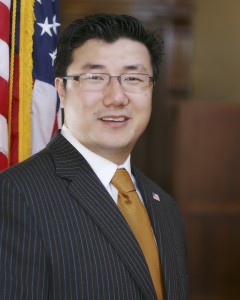 The Georgia House of Representatives has approved a measure dubbed the “good behavior bill,” that pushes for more discretion among juvenile court judges. The 169 to 1 vote came just in time to meet this week’s critical legislative “crossover day” deadline.
The Georgia House of Representatives has approved a measure dubbed the “good behavior bill,” that pushes for more discretion among juvenile court judges. The 169 to 1 vote came just in time to meet this week’s critical legislative “crossover day” deadline.
"I am so pleased with the passage of House Bill 373 and grateful to B.J. Pak, Jay Neal, Wendell Willard, Stacey Abrams, Yasmin Neal and all of the representatives who voted in support of the bill,” said Georgia Department of Juvenile Justice (DJJ) Commissioner Amy Howell. “It is great that our leadership understood the opportunity this bill presents for DJJ, our youth and Georgia. I am looking forward to working with the Senate."
The measure, which has been formally endorsed by DJJ and the Council of Juvenile Court Judges, would allow judges to review the sentences of felons who have served part of their terms for consideration for early release. The measure, sponsored by Rep. B.J. Pak (R-Lilburn), cleared the House Rules Committee on Friday and was heard on the House floor Monday.

Rep. Pak
“I think it’s good; obviously it’s something that has been worked on for several years,” Rep. Pak said, shortly after the vote. “This provides an incentive for juveniles in detention centers to behave. It allows them to petition the court for a modified sentence if he or she completes the terms of their sentence and demonstrates that they are rehabilitated. As the law stands now, they can’t even be considered for early release even if they have met all expectations.”
Emory University’s Barton Child Law and Policy Center Director Kirsten Widner said she was pleased with the House vote.
“I think it’s great that they recognize that they had a great bill in front of them,” she said.
The measure is now headed to the Senate where it will likely be heard by the Judiciary Committee headed by Sen. Bill Hamrick (R- Carrollton), Rep. Pak said.
“This provides these juveniles with more of a chance to get another shot,” he added. “It’s about time we do this.”
Howell has described the legislation as “good” for Georgia and DJJ. “It provides an incentive for youth to behave appropriately and focus on their education and rehabilitation from the moment they enter the system rather than waiting until the end of their commitment,” she said.
Crossover day — the critical mid-point in the legislative session, when Senate bills move over to the House and House bills transition to the Senate — is Wednesday. Any bills that have not passed a committee hearing by then will have to be considered later in the two-year legislative cycle.
Howell has said the measure “promotes long-term public safety” and provides an incentive for young people in detention centers to better themselves in preparation for life back in the community.
“I spoke with a young lady at Macon YDC who is a designated felon,” she said. “She has attained her diploma, completed technical trade training and is a behavioral model at the facility. She has another year of her five-year sentence to serve. She is worried about what she will do as a 21 year old and mother when she gets out. This bill gives the courts an opportunity to weigh whether there is a greater risk to long-term public safety if we leave a young lady like this locked up.”
Although it would likely be touted as a victory for child advocates in the state, final passage of HB 373 could also signal the end for Senate Bill 105 which proposes to establish a three-person juvenile parole panel within DJJ. One key difference between the measures is that one gives more discretion to juvenile court judges while the other leaves the child’s fate in the hands of parole board members appointed by the DJJ commissioner.
“My bill does not modify the sentence,” noted SB 105 sponsor Sen. Emanuel Jones (D-Decatur). “Under my bill, the child would have to spend time in a detention center and one third of his or her remaining time on supervised release.”
Sen. Jones had recently told JJIE.org that if his bill was not heard he would “attach it” to the massive Juvenile Code rewrite. Sources affiliated with Senate Bill 127, also known as the Child Protection and Public Safety Act, have hinted that some exciting updates are expected soon on the status of the code rewrite but they won’t elaborate at this time. So far it has not made it through the Senate Judiciary Committee (SJC). Failure to do so this session would be a major blow to supporters who have been involved in the rewriting process since 2004.
Sen. Jones now tells JJIE.org that he will support HB 373. “The key is getting something out there that works,” he said. “If HB 373 gets passed, let’s go with it. I wholeheartedly support it.”
He said he also backs the idea that Clayton County Juvenile Court Judge Steve Teske proposed to JJIE.org last month; pass HB 373, assess the data collected on it for a predetermined time and then only revisit the parole board model if data reveals problems with the execution of the good behavior bill.
“The ultimate goal is not to have good kids trapped in a bad system,” Sen. Jones said. “Anything that addresses that; I’m all for it.”
JJIE.org will be monitoring closely these final days in the session before crossover day. Keep checking here for updates.
This is a wonderful bill. I think its great for the children that are not really bad children but have maybe hung out with the wrong crowd, or might have been looking for attention from their parents and happened to step outside of their normal behavior. It gives them a chance to see what its like to be away from their families and what will happen if they continue to be around the wrong crowd. Now when they are released they should have a work plan, like school, chores, have a certain GPA, or complete a GED, and is applying to colleges and looking for work (depending on their ages)
I used to work for DJJ. at the Augusta YDC. There are several kids that have shown great behavor for quite some time and this new law would benefit them. But there are a few that do not behave. Just hope that who ever does the releasing carefully does it right and not let some of the gangbanger group out early.